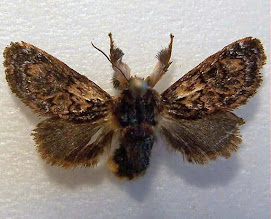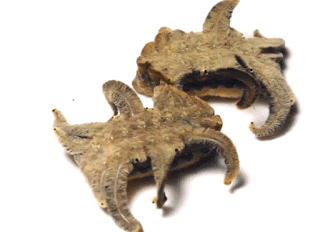The elephant in the room with this caterpillar
is of course it’s unusual appearance, which is really a cleverly designed
mashup of camouflage techniques. It has six hairy appendages that curl out from
either side of its body. When not moving, this brown insect could easily be mistaken
for a dead leaf. When it’s slowly making its way from one point to another, and its arms are
waving around a bit, it could be mistaken for a tarantula. Both are adaptations
to avoid predation. But why
would a caterpillar from the temperate part of North America hide as a
tarantula? According to this article, its
because many of the insectivorous birds in that area spend the winter in the
tropics and are well aware of the drawbacks to eating tarantulas.
While its appearance makes this caterpillar stand out, it’s not the only thing noteworthy about it. The Hag Moth Caterpillar is part of a family of caterpillars known as Slug Moth Caterpillars. These caterpillars have suckers and ambulate like slugs. And while all these caterpillars have the suckers thing in common, their appearances vary wildly. Unusual shapes, bright and often garish colorations, and prominent and abundant spines are characteristics of this family. However, there is something else rather important that cannot be ignored should you come across one – they have spines that are irritating to extremely irritating to very painful upon contact. With the Hag Moth Caterpillar, the spines (and there are lots of them) are under their hair. The level of discomfort that an individual experiences from this family of caterpillars varies from person to person and species to species. By most accounts, the Hag Moth Caterpillar is one of the less-painful species, but when it comes to any of these unusual-looking insects, it’s best to adopt a look-but-don’t-touch position.
The underside of a Hag Moth Caterpillar is just as interesting as its top. For one thing, they have a transparent abdomen, and you can see their open circulatory system in action. Here is a video of a rainforest species of slug caterpillar and an explanation of the “pulsing” that you can see. Although it uses its suckers to move itself around, the Hag Moth Caterpillar still has its true legs (as do all Slug Moth Caterpillars) up near its head and under its thorax. These legs are used primarily to hold onto things. With careful observation of the underside, you can find the little bitty legs of this caterpillar and the clusters of white spines hiding under the hair. The Hag Moth Caterpillar does not metamorphosize into a magical-looking and ethereal moth. It becomes a dark brown and fuzzy flying thing that retains a number of characteristics of its larval stage (but not the stinging trait). It is as unassuming and ordinary as its caterpillar is unusual and extraordinary.
Submitted by Pam











No comments:
Post a Comment